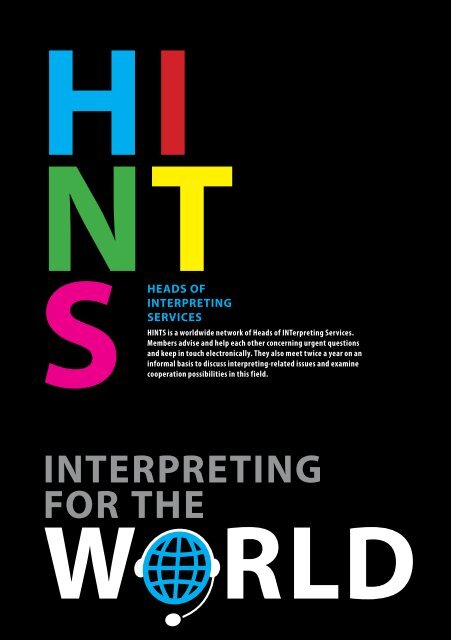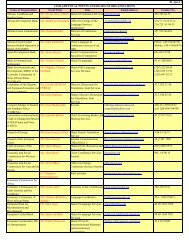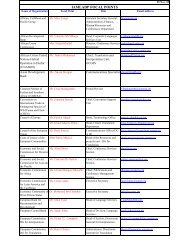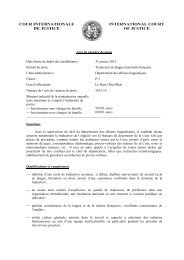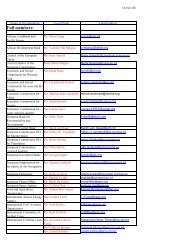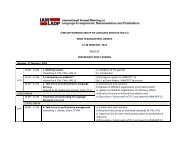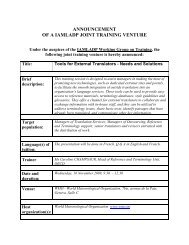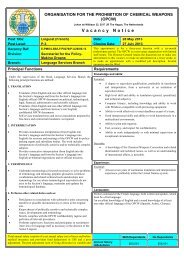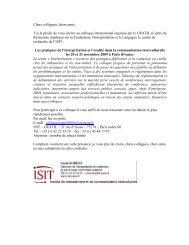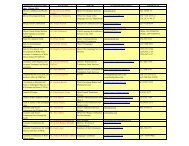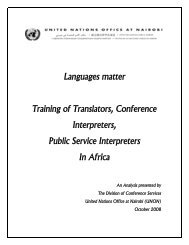INTERPRETING FOR THE - iamladp
INTERPRETING FOR THE - iamladp
INTERPRETING FOR THE - iamladp
You also want an ePaper? Increase the reach of your titles
YUMPU automatically turns print PDFs into web optimized ePapers that Google loves.
HI<br />
NT<br />
S<br />
HEADS<br />
OF<br />
<strong>INTERPRETING</strong><br />
SERVICES<br />
HINTS is a worldwide network of Heads of INTerpreting Services.<br />
Members advise and help each other concerning urgent questions<br />
and keep in touch electronically. They also meet twice a year on an<br />
informal basis to discuss interpreting-related issues and examine<br />
cooperation possibilities in this field.<br />
<strong>INTERPRETING</strong><br />
<strong>FOR</strong> <strong>THE</strong><br />
W RLD
<strong>INTERPRETING</strong> <strong>FOR</strong> <strong>THE</strong> WORLD<br />
International meetings and<br />
conferences are attended by people<br />
from different backgrounds and<br />
cultures who often speak different<br />
languages. It is always preferable<br />
to have the right people present<br />
rather than those who just happen<br />
to be good at foreign languages.<br />
Conference interpreters help them<br />
to communicate with each other, not<br />
by translating every word they utter,<br />
but by conveying the ideas which<br />
they express. They maintain complete<br />
confidentiality concerning what they<br />
hear and see.<br />
Interpreters are at the front line<br />
of multilingualism, working to<br />
ensure that language is no barrier<br />
to understanding. The interpreting<br />
services of the European Union,<br />
United Nations and other institutions<br />
are the world’s largest employers of<br />
conference interpreters. Whereas<br />
translators deal with the written word,<br />
interpreters make sense of the spoken<br />
word. They understand what is being<br />
said in one language and render that<br />
same message accurately and almost<br />
instantly in another. By enabling<br />
communication and facilitating<br />
dialogue, interpreters act as a bridge<br />
between cultures and often find<br />
themselves at the very heart of the<br />
decision-making process.<br />
There are two main techniques in<br />
interpreting. The first is consecutive,<br />
where the interpreter uses a special<br />
form of note-taking while the speaker<br />
is speaking and then gives back<br />
the speech in another language as<br />
soon as the speaker has finished.<br />
The second, which accounts for over<br />
90% of all conference interpreting, is<br />
simultaneous interpreting, where the<br />
interpreter will listen to the speaker<br />
and interpret at the same time whilst<br />
keeping pace with the speaker. This<br />
form of interpreting requires meeting<br />
rooms specially equipped with<br />
soundproof booths for the interpreters<br />
and electronic equipment for sound<br />
amplification, transmission and - often<br />
- recording.<br />
The language arrangements<br />
for international meetings vary<br />
considerably from consecutive<br />
interpretation between two languages,<br />
for which only one interpreter<br />
may be required, to simultaneous<br />
interpretation at EU-meetings into and<br />
out of 22 or more languages, which<br />
requires at least 66 interpreters.
How can you become<br />
an interpreter?<br />
Many people believe that to be an interpreter you<br />
need to be fluent in half a dozen languages. This<br />
is a myth: the majority of conference interpreters<br />
interpret only into their mother tongue!<br />
A postgraduate-level programme is considered to<br />
be the most appropriate way to train high-quality<br />
conference interpreters. One benchmark is the<br />
European Masters in Conference Interpreting.<br />
See EMCI: http://www.emcinterpreting.org<br />
Career opportunities with<br />
the interpreting services<br />
Different international organizations have different<br />
hiring practices, with more or fewer staff<br />
positions. Some have staff who only interpret;<br />
others have staff who also translate. All of them<br />
hire freelance interpreters. If you are interested in<br />
working for a particular organization, you should<br />
contact them individually.
Arte<br />
Chaîne de télévision culturelle<br />
européenne, ARTE diffuse le même<br />
programme dans toute l’Europe en<br />
français et en allemand, ses deux<br />
langues officielles.<br />
Créée il y a bientôt 20 ans à l’initiative<br />
de la France et de l’Allemagne, elle<br />
compte aujourd’hui une dizaine de<br />
chaînes partenaires dans toute l’Europe.<br />
Son siège et son antenne sont<br />
à Strasbourg, où travaillent<br />
quotidiennement plus de 400 salariés.<br />
Les programmes diffusés sont<br />
originaires pour un tiers de France, un<br />
tiers d’Allemagne et un tiers d’Europe et<br />
du monde.<br />
Outre ses missions de traduction<br />
de tous types de documents<br />
institutionnels, mais aussi de textes<br />
destinés au site internet arte.tv ou à la<br />
presse, le Service linguistique a pour<br />
charge d’organiser et de mettre en<br />
œuvre l’interprétation des réunions et<br />
conférences ainsi que des émissions de<br />
télévision.<br />
Pour réaliser la seconde version<br />
linguistique des émissions d’information<br />
et des débats télévisés, mais aussi des<br />
vidéos diffusées sur le Web, Arte fait<br />
appel à des interprètes indépendants<br />
formés aux spécificités de ce type de<br />
travail (plus de 2000 contrats par an).<br />
Investie d’une mission transfrontalière,<br />
ARTE s’est dotée d’un service<br />
linguistique (fait rarissime dans<br />
l’audiovisuel !) qui emploie une dizaine<br />
de permanents appelés à des tâches de<br />
traduction et d’interprétation.<br />
More information can be found at:<br />
http://www.arte.tv
The Council of Europe<br />
The Council of Europe is Europe’s<br />
Human Rights’ watchdog and is<br />
based in Strasbourg. Its two official<br />
languages are French and English, but<br />
it also has German, Italian, Russian and<br />
occasionally Spanish, Greek and Turkish<br />
as working languages.<br />
Interpretation at the Council of<br />
Europe is varied as it involves working<br />
for intergovernmental meetings,<br />
monitoring bodies, parliamentary<br />
committees and the European Court of<br />
Human Rights.<br />
The Council of Europe has a limited<br />
number of staff interpreters and is a<br />
big recruiter of bi-active English-French<br />
freelancers (7000 interpreter-days per<br />
year) as well as bi-active interpreters<br />
in all its member States (the language<br />
of the country concerned and English<br />
or French). It also recruits multi-lingual<br />
interpreters for its many Parliamentary<br />
Committee meetings in Paris or<br />
elsewhere.<br />
More information can be found at:<br />
http://www.coe.int
The Court of Justice of<br />
the European Union<br />
The Court in Luxembourg constitutes<br />
the judicial authority of the European<br />
Union and, in cooperation with the<br />
courts and tribunals of the Member<br />
States, it ensures the uniform<br />
application and interpretation of<br />
European Union law. In order to<br />
guarantee equal access to justice at EUlevel,<br />
it is essential to enable the parties<br />
to express themselves in their own<br />
language. Simultaneous interpretation<br />
is provided during the public hearings<br />
before the Court of Justice, the General<br />
Court and the Civil Service Tribunal.<br />
The interpreters must understand not<br />
only the languages but also the detail of<br />
the subject-matter, so careful study of<br />
the case-file is an integral part of their<br />
work.<br />
The Court of Justice of the EU has<br />
70 staff interpreters and employs on<br />
average 350 freelance interpreters each<br />
year for 65 interpreter days per working<br />
week.<br />
The number of languages used<br />
varies from one hearing to another,<br />
depending on the needs of the parties,<br />
the judges and the official languages of<br />
the Member States involved.<br />
More information can be found at:<br />
http://www.curia.europa.eu
EUROCONTROL<br />
EUROCONTROL, the European<br />
Organisation for the Safety of<br />
Air Navigation, is a civil-military<br />
intergovernmental organisation with<br />
38 Member States across the European<br />
continent as well as the European<br />
Community. Its primary objective is<br />
the development of a seamless pan-<br />
European air traffic management (ATM)<br />
system.<br />
The Agency, EUROCONTROL’s executive<br />
body, is organised in several business<br />
units in seven European cities and its<br />
Headquarters is based in Brussels.<br />
Up to 12 languages are used in<br />
EUROCONTROL’s governing bodies<br />
and in some of the main consultative<br />
groups.<br />
These are: English, French, German,<br />
Dutch, Portuguese, Greek, Turkish,<br />
Danish, Norwegian, Swedish, Spanish<br />
and Italian. The official languages of the<br />
EUROCONTROL Organisation are all the<br />
languages of its Member States while<br />
the working languages of the Agency<br />
are English and French.<br />
EUROCONTROL has six staff interpreters<br />
and recruits up to 500 freelance<br />
interpreter/days per year. All together<br />
they provide 660 interpreter/days per<br />
year for its bilingual and multilingual<br />
meetings.<br />
More information can be found at:<br />
http://www.eurocontrol.int
The European<br />
Commission<br />
TERPRETATION AND CONFERENCES<br />
The Directorate General for<br />
Interpretation (DG Interpretation) is<br />
part of the European Commission,<br />
the executive organ of the European<br />
Union headquartered in Brussels.<br />
DG Interpretation provides quality<br />
interpretation in meetings organised<br />
by the Commission and the other<br />
Institutions it serves, and is also a<br />
conference organiser for Commission<br />
services.<br />
The Council of the Union, The<br />
Committee of the Regions, The<br />
European Economic and Social<br />
Committee, The European Investment<br />
Bank, and the agencies and offices<br />
in the Member States all get their<br />
interpreters from DG Interpretation.<br />
The European Commission aims to<br />
serve the actual need for interpreters<br />
and provides interpreters worldwide.<br />
Long-standing training schemes with<br />
Universities and Authorities of Member<br />
States and Non-member States (e.g.<br />
Turkey, USA, Russia, China, Vietnam…)<br />
contribute to a steady supply of<br />
interpreters around the globe.<br />
DG Interpretation has 550 staff<br />
interpreters and provides some 150,000<br />
interpreter days per year, of which<br />
about half are freelance days.<br />
More information can be found at:<br />
http://ec.europa.eu/dgs/scic/index.htm
The European<br />
Parliament<br />
DG INTERPRETATION AND CONFERENCES<br />
DG Interpretation and Conferences<br />
supplies interpreters for all the<br />
European Parliament’s meetings, as<br />
well as for other services outside the<br />
EP including the Court of Auditors,<br />
the Committee of the Regions, the<br />
European Ombudsman, the European<br />
Data Protection Officer, the European<br />
Commission in Luxembourg and the<br />
Translation Centre. An increasing<br />
number of the Parliament’s meetings<br />
are broadcast live on the internet. As<br />
well as travelling to Strasbourg every<br />
month for the plenary sessions, the<br />
EP’s interpreters travel all over the<br />
world, accompanying delegations<br />
to overseas conferences, on visits to<br />
other parliaments and on election<br />
observation missions.<br />
Meetings using all 23 official languages<br />
are held on a regular basis and other<br />
languages such as Russian, Arabic and<br />
Chinese are also often needed. DG INTE<br />
has close links to universities training<br />
interpreters.<br />
DG Interpretation and Conferences<br />
has 380 staff interpreters and provides<br />
some 110,000 interpreter days per year,<br />
of which about half are freelance days.<br />
More information can be found at:<br />
http://www.europarl.europa.eu/interpretation
The European<br />
Patent Organisation<br />
The European Patent Office (EPO) is the<br />
executive arm of the European Patent<br />
Organisation, an intergovernmental<br />
organisation with currently 36 member<br />
states working to support innovation,<br />
competitiveness and economic growth<br />
in Europe. The EPO’s task is to grant<br />
European patents for inventions on<br />
the basis of a centralised procedure.<br />
With a single patent application, patent<br />
protection can be obtained in up to 38<br />
states.<br />
Today the EPO is the second largest<br />
European organisation, with 6 700<br />
employees from some 30 nations. The<br />
EPO has its headquarters in Munich, a<br />
branch in The Hague (most meetings<br />
are in those two cities), and offices in<br />
Berlin and Vienna.<br />
The official languages of the EPO are<br />
English, French and German. Whilst<br />
there are about 30 staff translators,<br />
the EPO relies exclusively on freelance<br />
interpreters to provide simultaneous<br />
interpretation for oral proceedings<br />
and meetings. The EPO has no staff<br />
interpreters and recruits up to 60 freelance<br />
interpreters per week (up to 100<br />
interpreter days per week). All together,<br />
they provide some 4000 interpreter<br />
days per year.<br />
Apart from interpretation in the three<br />
official languages, there is a limited but<br />
regular demand for Japanese, Chinese<br />
and Korean.<br />
More information can be found at:<br />
http://www.epo.org
The Food and<br />
Agriculture<br />
Organization of the<br />
United Nations<br />
The FAO in Rome leads international<br />
efforts to defeat hunger. We help<br />
developing countries and countries<br />
in transition modernize and improve<br />
agriculture, forestry and fisheries<br />
practices and ensure good nutrition for<br />
all. Since our founding in 1945, we have<br />
focused special attention on developing<br />
rural areas, home to 70 percent of the<br />
world’s poor and hungry people.<br />
The languages of the Organization are<br />
those of the UN, that is Arabic, Chinese,<br />
English, French, Spanish and, since<br />
2008, Russian. We occasionally use<br />
Italian, Portuguese and German. Some<br />
eighty per cent of meetings are held at<br />
Headquarters, the rest in all continents.<br />
FAO has few permanent interpreters<br />
and relies on free-lances for over 85%<br />
of its needs. The local free-lance pool<br />
is relatively small, so many interpreters<br />
are recruited from abroad. The most<br />
acute scarcity of free-lances has been,<br />
since 2008, for English with Russian.<br />
Arabic interpreters are also much in<br />
demand. On average, we provide 3500<br />
interpreters/days at HQ, and 500 in the<br />
Field.<br />
More information can be found at:<br />
http://www.fao.org
Government of Canada<br />
Translation Bureau<br />
The Translation Bureau provides<br />
interpretation to all Government of<br />
Canada departments and agencies,<br />
as well as to Parliament, through two<br />
sectors: Parliamentary Interpretation<br />
and Conference Interpretation.<br />
The Parliamentary Interpretation<br />
Service supports the House of<br />
Commons, Senate, Cabinet, and all<br />
their committees, as well as press<br />
conferences and parliamentary<br />
associations with interpretation services<br />
in both English and French. Interpreters<br />
regularly travel across Canada and<br />
abroad with Senators and Members<br />
of Parliament on parliamentary<br />
committees.<br />
The Conference Interpretation Service<br />
supports international and bilateral<br />
events, departmental conferences,<br />
meetings between federal ministers<br />
and their provincial or territorial<br />
counterparts, and high-level missions<br />
between Canada and other nations.<br />
Their services are available in Canada’s<br />
official languages and foreign<br />
languages, as well as in Canada’s<br />
Aboriginal languages<br />
In total, the Bureau has approximately<br />
70 staff interpreters and contracts<br />
work out to freelance interpreters. Staff<br />
interpreters work almost exclusively in<br />
Canada’s official languages, although<br />
some are also accredited in a third<br />
language.<br />
On average, the Bureau provides<br />
Parliament and Canadian government<br />
departments with over 18,000 days of<br />
interpretation services each year.<br />
More information can be found at:<br />
http://www.btb.gc.ca
The International<br />
Criminal Court<br />
The ICC, at The Hague, governed by the<br />
Rome Statute, is the first permanent,<br />
treaty-based, international criminal<br />
court established to help end impunity<br />
for the perpetrators of the most serious<br />
crimes of concern to the international<br />
community, including genocide, crimes<br />
against humanity and war crimes. The<br />
ICC is an independent international<br />
organisation, and is not part of the<br />
United Nations system.<br />
The working languages of the ICC<br />
are English and French. The official<br />
languages of the Court include the<br />
working languages as well as Arabic,<br />
Chinese, Russian and Spanish. Staff<br />
interpreters (20) also translate and/or<br />
work on terminology or other projects.<br />
The languages currently used in the<br />
courtroom are Swahili (Democratic<br />
Republic of the Congo, DRC) and<br />
Lingala (also DRC).<br />
The ICC has designed and run<br />
paraprofessional interpretation courses<br />
in the above languages as well as in<br />
Acholi (northern Uganda). One of the<br />
new languages to be used in Court<br />
in 2010 will be Sango (Central African<br />
Republic). The ICC had 2204 interpreter<br />
days in 2009, including 1176 freelance<br />
interpreter days.<br />
More information can be found at:<br />
http://www.icc-cpi.int
The International<br />
Criminal Tribunal for<br />
the former Yugoslavia<br />
The ICTY, located in The Hague, The<br />
Netherlands, is a United Nations court<br />
of law established in 1993 to prosecute<br />
persons responsible for serious<br />
violations of international humanitarian<br />
law committed in the territory of the<br />
former Yugoslavia since 1991. At the<br />
time of its establishment, the ICTY was<br />
the first war crimes court created by the<br />
UN and the first international war crimes<br />
tribunal since the Nuremberg and Tokyo<br />
tribunals. It is expected to close in 2014<br />
after completing its mandate.<br />
English and French are the official<br />
languages of the Tribunal. The accused<br />
speak Bosnian/Croatian/Serbian (BCS),<br />
Albanian or Macedonian. Simultaneous<br />
interpretation in English, French and<br />
the language of the accused is provided<br />
during all court hearings and sessions.<br />
The ICTY has 35 staff interpreters and<br />
recruits up to 15 free-lance interpreters<br />
per week. All together, they provide<br />
some 7,000 interpreter days per year.<br />
More information can be found at:<br />
http://www.icty.org
The International<br />
Labour Organization<br />
The International Labour Organization<br />
(ILO) was founded in 1919 and is the<br />
United Nations Agency devoted to<br />
labour issues. In 1946 it became the<br />
first specialized agency associated<br />
with the newly formed United Nations<br />
Organization.<br />
The ILO is the only “tripartite”<br />
United Nations agency in that it<br />
brings together representatives of<br />
governments, employers and workers to<br />
jointly shape policies and programmes.<br />
The ILO is the global body responsible<br />
for drawing up and overseeing<br />
international labour standards. Working<br />
with its 183 member states, the ILO<br />
seeks to ensure that labour standards<br />
are respected in practice as well as in<br />
principle.<br />
The main meetings at the ILO are the<br />
International Labour Conference in<br />
June and the two annual sessions of<br />
the Governing Body, in March and in<br />
November.<br />
The official languages are English,<br />
French and Spanish, and Arabic,<br />
Chinese, German and Russian are<br />
working languages. Interpretation is<br />
provided in all these languages for the<br />
ILC and the GB sessions. Japanese and<br />
passive Portuguese are used at the ILC<br />
and passive Portuguese has also been<br />
used recently at the GB.<br />
There are numerous sectoral and other<br />
smaller meetings throughout the year<br />
where some or all of these languages<br />
are used. The ILO has no permanent<br />
staff interpreters, and is dependent on<br />
a large pool of freelance interpreters to<br />
service its meetings. ( It is the largest<br />
recruiter of freelance interpreters in<br />
the UN system, using close to 400<br />
interpreters for the ILC).<br />
More information can be found at:<br />
http://www.ilo.org
International<br />
Monetary<br />
Fund<br />
The IMF is an organization of 186<br />
countries with 2,400 staff members<br />
with headquarters in Washington D.C. It<br />
was created to foster global monetary<br />
cooperation, exchange stability,<br />
promote economic growth, high levels<br />
of employment and to provide financial<br />
and technical assistance to its member<br />
countries.<br />
Interpretation for ministerial<br />
conferences is mainly provided into<br />
Arabic, Chinese, English, French,<br />
Russian, Portuguese and Spanish. The<br />
majority of meetings with member<br />
countries in Washington and in the field<br />
are conducted in the national language<br />
and English, hence our interest in<br />
colleagues of all booths with a solid<br />
retour into English.<br />
All interpreters working for the IMF, be<br />
it staff or freelancers, are expected to<br />
combine interpretation and translation<br />
duties.<br />
With 15 staff interpreters, the IMF<br />
heavily relies on freelance interpreters<br />
for assignments in Washington and in<br />
over 100 countries. We currently provide<br />
about 10,000 interpretation days per<br />
year.<br />
More information can be found at:<br />
http://www.imf.org
The NATO<br />
Defense College<br />
The NATO Defense College (NDC)<br />
concentrates on the high-level<br />
political-military issues that confront<br />
both civilian and military leadership at<br />
Alliance and at national level, striving<br />
to promote debate and to develop<br />
consensus-building and other skills<br />
needed to succeed in a multinational<br />
environment. NDC runs courses for<br />
senior officers and civilians, carries out<br />
research into security policy and runs a<br />
number of outreach programmes.<br />
Freelance interpreters are mostly<br />
recruited for the NATO Regional<br />
Cooperation Course, with simultaneous<br />
interpretation in Arabic, English<br />
and French. Italian, the Host-Nation<br />
language, is also regularly used and<br />
Russian occasionally. The NDC recruits<br />
up to 40 freelance interpreters per week<br />
over two ten-week periods, a total of<br />
approximately 800 interpreter days per<br />
year.<br />
As of December 2010, the four NDC staff<br />
linguists will be officially designated<br />
as Interpreter-Translators (LI-3/4),<br />
interpreting both ways into the NATO<br />
official languages, English and French,<br />
while performing written translation<br />
into their respective mother tongues.<br />
More information can be found at:<br />
http://www.ndc.nato.int
The North Atlantic<br />
Treaty Organization<br />
NATO has its diplomatic and<br />
administrative headquarters in<br />
Brussels with some 1300 staff. It is an<br />
international organization founded<br />
in 1948 on the principles of collective<br />
defence and transatlantic security<br />
solidarity. NATO currently numbers 28<br />
Member States and has a number of<br />
partnership structures.<br />
80% of our 10-12 daily meetings<br />
are provided with French-English<br />
interpretation, while for ministerial<br />
and summit meetings as many as<br />
18 languages may be provided by<br />
interpreters recruited either by NATO<br />
or by the respective Foreign or Defence<br />
ministries.<br />
NATO’s official languages are French<br />
and English. Russian, while not having<br />
official status, has for some years<br />
been regularly used. The organization<br />
employs some 55 translators and<br />
40 bi-active staff interpreters. Semiautonomous<br />
NATO entities in Mons,<br />
Belgium (SHAPE), Rome (NDC) and<br />
Luxembourg (NAMSA) employ small<br />
numbers of staff interpreter/translators.<br />
More information can be found at:<br />
http://www.nato.int
The Organisation for<br />
Economic Cooperation<br />
and Development<br />
The OECD provides a setting where<br />
governments of democratic market<br />
economies can compare policy<br />
experiences, seek answers to common<br />
problems, identify good practice and<br />
coordinate domestic and international<br />
policies.<br />
OECD’s work is based on continued<br />
monitoring of events in member<br />
countries as well as outside the OECD<br />
area, and includes regular<br />
projections of short and medium-term<br />
economic developments. The OECD<br />
Secretariat collects and analyses data on<br />
the basis of which<br />
the Organisation makes<br />
recommendations to the Member<br />
governments.<br />
From its headquarters in Paris it recruits<br />
mostly from the Paris FR-EN bi-active<br />
market, with some other languages<br />
required for occasional meetings, most<br />
frequently Arabic, Chinese, German,<br />
Italian, Portuguese, Russian, and<br />
Spanish.<br />
OECD employs 19 staff interpreters on a<br />
full-time or part-time basis, and recruits<br />
roughly 900 free-lance interpreter days,<br />
almost exclusively in Paris, every year.<br />
More information can be found at:<br />
http://www.oecd.org
The Organization<br />
for Security and<br />
Co-operation in Europe<br />
With 56 participating States from<br />
Europe, Central Asia and North America,<br />
the OSCE, with its Secretariat in<br />
Vienna, is the largest regional security<br />
organization in the world.<br />
The Organization deals with<br />
three dimensions of security - the<br />
politico-military, the economic and<br />
environmental, and the human. It<br />
therefore addresses a wide range<br />
of security-related concerns, based<br />
on the concept of comprehensive<br />
and indivisible security. Decisions<br />
are politically binding and taken by<br />
consensus.<br />
The working languages of the OSCE<br />
and the two associated Treaties (on<br />
Conventional Armed Forces in Europe<br />
and on the Open Skies) are English,<br />
French, German, Italian, Russian and<br />
Spanish. Interpretation and translation<br />
are provided eight to nine months in a<br />
year, by freelancers only.<br />
The OSCE Language Services Section<br />
is responsible for recruitment (more<br />
than 3,000 interpreter contract days per<br />
year) and the management of service<br />
requests.<br />
More information can be found at:<br />
http://www.osce.org
Special Tribunal<br />
for Lebanon<br />
The Special Tribunal for Lebanon<br />
is remitted with prosecuting those<br />
responsible for the Beirut bombing of<br />
14 February 2005 which resulted in the<br />
death of former Prime Minister Rafiq<br />
Hariri and in the death or injury of other<br />
persons. The Tribunal’s jurisdiction may<br />
be extended to events other than that<br />
bombing if the judges find that other<br />
attacks are connected to the attack of<br />
14 February.<br />
Interpretation services are provided by<br />
the Language Services Section which<br />
is part of the Registry. The Section<br />
is based at the seat of the Tribunal<br />
in The Hague and has a branch in<br />
the Tribunal’s field office in Beirut.<br />
The Section employs both staff and<br />
freelance interpreters.<br />
The official languages of the Tribunal<br />
are Arabic, French and English. The<br />
working languages of each case will<br />
be decided by the judges. Court<br />
proceedings will also be interpreted<br />
into the language understood by<br />
the accused, should he or she not<br />
understand the working language(s).<br />
The Section provides interpretation<br />
services to all organs of the Tribunal<br />
in the official and other languages<br />
as required. The number of staff and<br />
freelance interpreters employed by<br />
STL is set to rise substantially from the<br />
team of three staff interpreters and 25<br />
freelance interpreters who covered its<br />
needs in its first year of operations.<br />
More information can be found at:<br />
http://www.stl-tsl.org
United Nations<br />
The Interpretation Services of the<br />
United Nations provide simultaneous<br />
interpretation for the six official<br />
languages: Arabic, Chinese, English,<br />
French, Russian and Spanish. UN<br />
interpreters cover various topics<br />
reflecting the nature of work at each<br />
of the four main conference centres.<br />
In New York, the political hub of the<br />
United Nations, they service meetings<br />
of the General Assembly, the Security<br />
Council, the Economic and Social<br />
Council and all their subsidiary bodies.<br />
In Geneva, interpreters deal more<br />
with human rights, disarmament and<br />
various technical subjects. In Nairobi,<br />
interpreters facilitate multilateral<br />
communication for the United Nations<br />
Environmental Programme, the UN<br />
Habitat and other bodies. In Vienna,<br />
where United Nations bodies dealing<br />
with drugs, crime, and outer space are<br />
based, interpreters cover the meetings<br />
of intergovernmental bodies dealing<br />
with these subjects, as well as meetings<br />
of the International Atomic Energy<br />
Agency.<br />
More information can be found at:<br />
For more information about each of the<br />
four locations please visit www.un.org<br />
Staff interpreters must have passed<br />
the UN Competitive Examination for<br />
Interpreters. The frequency of the<br />
examinations depends upon the<br />
needs of the Organization. Freelance<br />
interpreters must have passed an ad<br />
hoc test.<br />
In 2009, the interpreting workload at<br />
each of the duty stations was as follows:<br />
New York<br />
32, 741 interpreter assignments<br />
5, 298 freelance workdays<br />
Geneva<br />
26, 720 interpreter assignments<br />
2, 120 freelance workdays<br />
Vienna<br />
3, 721 interpreter assignments<br />
2,290 freelance working days<br />
Nairobi<br />
2,414 interpreter assignments<br />
1,053 freelance working days<br />
http://www.un.org
US Department<br />
of State<br />
The Mission of the Office of Language<br />
Services of the Department of State<br />
is to facilitate communication with<br />
non-English speaking governments<br />
and people by providing high-level<br />
interpreting and translating support to<br />
the Executive Office of the President,<br />
the Department of State, and other<br />
agencies of the United States Federal<br />
Government.<br />
Our contract interpreters are tested<br />
for consecutive, simultaneous and/or<br />
conference work at three different levels<br />
of skill in over 40 languages.<br />
Staff interpreters must hold US<br />
citizenship. Contract interpreters may<br />
be foreign nationals, but they must be<br />
able to work legally in the United States.<br />
The Office of Language Services carries<br />
on a tradition of language support<br />
for the conduct of foreign policy<br />
that dates back to 1789, when it was<br />
founded by Thomas Jefferson, the first<br />
Secretary of State of the United States<br />
of America. We have approximately 20<br />
staff diplomatic/conference interpreters<br />
representing a dozen languages.<br />
More information can be found at:<br />
http://languageservices.state.gov
The World Bank Group<br />
The World Bank Group, among<br />
the world’s largest development<br />
institutions, is a major source of financial<br />
and technical assistance to developing<br />
countries around the world. Its member<br />
institutions-the International Bank<br />
for Reconstruction and Development<br />
(IBRD), the International Development<br />
Association (IDA), the International<br />
Finance Corporation (IFC), the<br />
Multilateral Investment Guarantee<br />
Agency (MIGA), and the International<br />
Centre for Settlement of Investment<br />
Disputes (ICSID)-work together and<br />
complement each other’s activities to<br />
achieve their shared goals of reducing<br />
poverty and improving lives.<br />
The working language of the World<br />
Bank Group is English. Other languages,<br />
mainly French, Spanish, Russian,<br />
Portuguese, Chinese, Arabic and<br />
American Sign Language are offered<br />
upon request and on an internal charge<br />
back basis. French interpretation<br />
is provided twice per week for the<br />
meetings of the Board of Directors.<br />
Most interpretation services are<br />
outsourced to freelance interpreters.<br />
Given that most of the meetings<br />
held at HQ are held in English, all<br />
interpreters are expected to work in the<br />
bidirectional mode.<br />
Bank staff represent 165 countries. The<br />
work of IBRD and IDA is performed<br />
by about 9,000 staff working in<br />
Washington, DC, and in almost 120<br />
country offices worldwide.<br />
More information can be found at:<br />
http://www.worldbank.org
World Health<br />
Organization<br />
WHO is the directing and coordinating<br />
authority for global health matters<br />
within the United Nations system.<br />
Some 8000 health and other support<br />
staff work for WHO on fixed-term<br />
appointments, at headquarters<br />
(Geneva), in the 6 regional offices and in<br />
145 country offices.<br />
WHO has 6 official languages: Arabic,<br />
Chinese, English, French, Russian and<br />
Spanish. Other languages, mainly<br />
German and Portuguese are used in<br />
regional meetings.<br />
Besides WHO Governing bodies<br />
(the World Health Assembly and the<br />
Executive Board) interpretation is also<br />
required by many Technical Units and<br />
for regular Consultations with member<br />
States on wide ranging topics.<br />
WHO recruits up to 230 free-lance<br />
interpreters per year. All together, they<br />
provide some 3000 interpreter days per<br />
year.<br />
Nevertheless, 40% of the meetings that<br />
require interpretation use English and<br />
one other language only. Hence our<br />
interest in colleagues with a solid retour<br />
into English. With no staff interpreters,<br />
the organization relies fully on freelance<br />
interpreters.<br />
More information can be found at:<br />
http://www.who.int
World Trade<br />
Organization<br />
The World Trade Organization (WTO)<br />
is the only global international<br />
organization dealing with the rules of<br />
trade between nations. At its heart are<br />
the WTO agreements, negotiated and<br />
signed by the bulk of the world’s trading<br />
nations and ratified in their parliaments.<br />
The goal is to help producers of goods<br />
and services, exporters, and importers<br />
conduct their business. The WTO has its<br />
headquarters in Geneva, where most of<br />
its meetings are held.<br />
Approximately 500 meetings with<br />
interpretation are organized annually,<br />
requiring recruitment of up to 3000<br />
free-lance interpreters.<br />
WTO should be considered a ‘technical’<br />
organization, and interpreters<br />
working at the WTO need to have<br />
a good understanding of the issues<br />
under discussion and be prepared to<br />
assimilate the large number of technical<br />
terms commonly used.<br />
The WTO works with 3 official<br />
languages: English, French and Spanish.<br />
With only 6 staff interpreters, the<br />
organization relies on recruitment<br />
of free-lance interpreters to provide<br />
simultaneous interpretation for its<br />
meetings.<br />
More information can be found at:<br />
http://www.wto.org
Notes...
HI<br />
NT<br />
S<br />
Produced by:<br />
DG Interpretation,<br />
European Commission<br />
March, 2010


